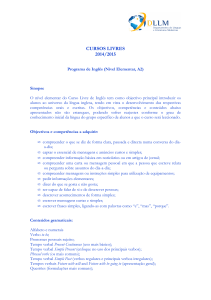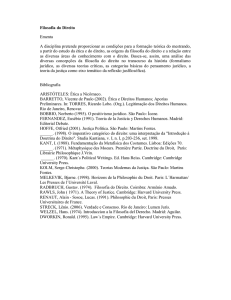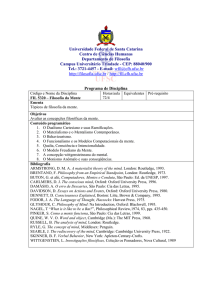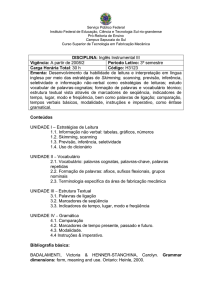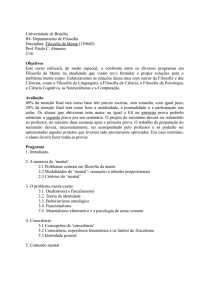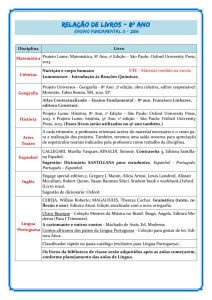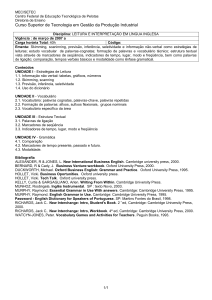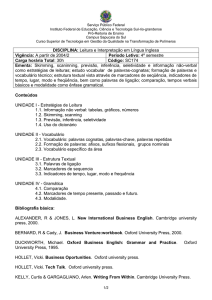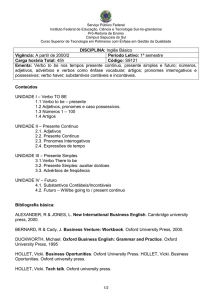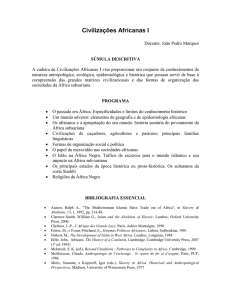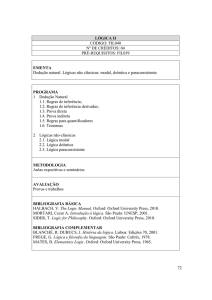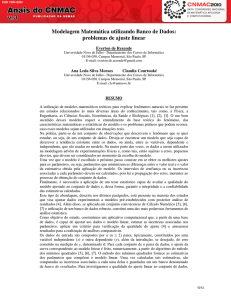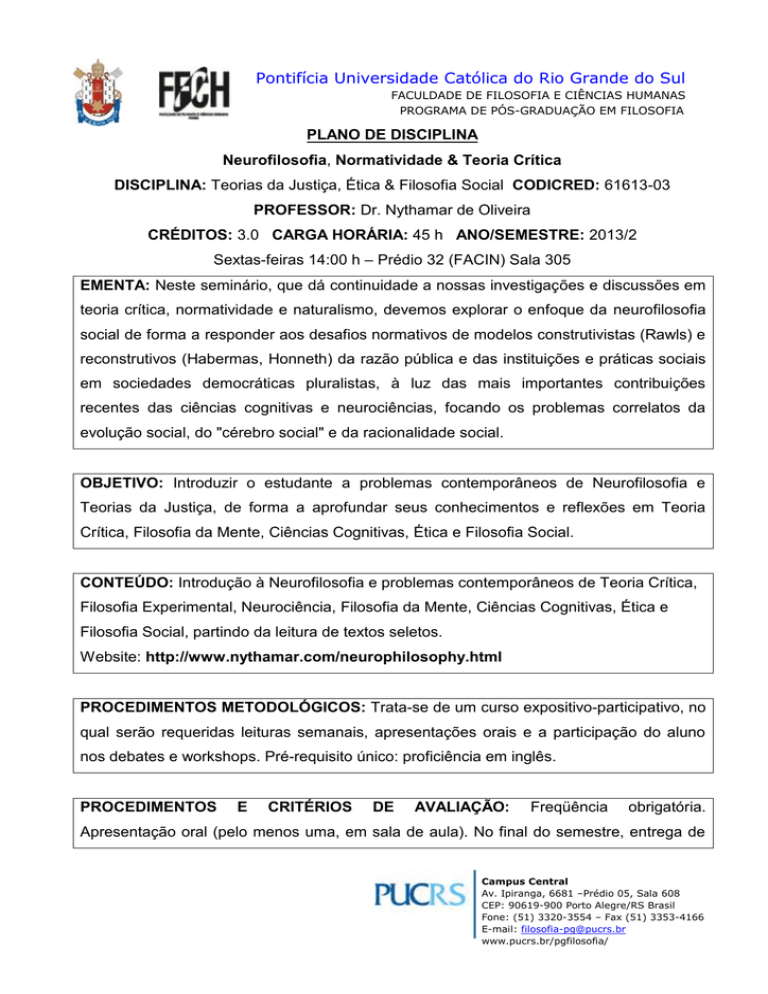
Pontifícia Universidade Católica do Rio Grande do Sul
FACULDADE DE FILOSOFIA E CIÊNCIAS HUMANAS
PROGRAMA DE PÓS-GRADUAÇÃO EM FILOSOFIA
PLANO DE DISCIPLINA
Neurofilosofia, Normatividade & Teoria Crítica
DISCIPLINA: Teorias da Justiça, Ética & Filosofia Social CODICRED: 61613-03
PROFESSOR: Dr. Nythamar de Oliveira
CRÉDITOS: 3.0 CARGA HORÁRIA: 45 h ANO/SEMESTRE: 2013/2
Sextas-feiras 14:00 h – Prédio 32 (FACIN) Sala 305
EMENTA: Neste seminário, que dá continuidade a nossas investigações e discussões em
teoria crítica, normatividade e naturalismo, devemos explorar o enfoque da neurofilosofia
social de forma a responder aos desafios normativos de modelos construtivistas (Rawls) e
reconstrutivos (Habermas, Honneth) da razão pública e das instituições e práticas sociais
em sociedades democráticas pluralistas, à luz das mais importantes contribuições
recentes das ciências cognitivas e neurociências, focando os problemas correlatos da
evolução social, do "cérebro social" e da racionalidade social.
OBJETIVO: Introduzir o estudante a problemas contemporâneos de Neurofilosofia e
Teorias da Justiça, de forma a aprofundar seus conhecimentos e reflexões em Teoria
Crítica, Filosofia da Mente, Ciências Cognitivas, Ética e Filosofia Social.
CONTEÚDO: Introdução à Neurofilosofia e problemas contemporâneos de Teoria Crítica,
Filosofia Experimental, Neurociência, Filosofia da Mente, Ciências Cognitivas, Ética e
Filosofia Social, partindo da leitura de textos seletos.
Website: http://www.nythamar.com/neurophilosophy.html
PROCEDIMENTOS METODOLÓGICOS: Trata-se de um curso expositivo-participativo, no
qual serão requeridas leituras semanais, apresentações orais e a participação do aluno
nos debates e workshops. Pré-requisito único: proficiência em inglês.
PROCEDIMENTOS
E
CRITÉRIOS
DE
AVALIAÇÃO:
Freqüência
obrigatória.
Apresentação oral (pelo menos uma, em sala de aula). No final do semestre, entrega de
Campus Central
Av. Ipiranga, 6681 –Prédio 05, Sala 608
CEP: 90619-900 Porto Alegre/RS Brasil
Fone: (51) 3320-3554 – Fax (51) 3353-4166
E-mail: [email protected]
www.pucrs.br/pgfilosofia/
Pontifícia Universidade Católica do Rio Grande do Sul
FACULDADE DE FILOSOFIA E CIÊNCIAS HUMANAS
PROGRAMA DE PÓS-GRADUAÇÃO EM FILOSOFIA
um trabalho escrito (paper de 20 ou mais páginas; tópico e bibliografia a serem
previamente discutidos com o professor).
BIBLIOGRAFIA BÁSICA:
Chalmers, David J. 2002. Philosophy of Mind: Classical and Contemporary Readings.
Oxford University Press.
Churchland, Patricia. 2002. Brain-Wise: Studies in neurophilosophy. Cambridge, Mass.:
MIT Press.
Churchland, Patricia. 2011. Braintrust: What neuroscience tells us about morality.Princeton
U Press.
Damásio, António. 1994. Descartes’ Error: Emotion, reason, and the human brain. New
York: Putnam. Em português: O Erro de Descartes: Emoção, razão e o cérebro humano.
2a. edição. São Paulo: Companhia das Letras, 2005.
Damásio, António. 2003. Looking for Spinoza: Joy, sorrow and the feeling brain. New York:
Harcourt, Inc.
BIBLIOGRAFIA COMPLEMENTAR:
Appiah, K.A. 2008. Experiments in Ethics. Cambridge, Mass.: Harvard University Press.
Bickle, John (editor) 2008. Oxford Handbook of Philosophy and Neuroscience. Oxford U
Press.
Changeux, Jean-Pierre & Paul Ricoeur. 1998. Ce qui nous fait penser. La nature et la
règle. Paris: Odile Jacob.
Churchland, Patricia S. 1986. Neurophilosophy: Toward A Unified Science of the MindBrain. Bradford Books. Cambridge, MA: MIT Press.
Churchland, P. 2008. "The impact of neuroscience on philosophy". Neuron, 60, 409-411.
Churchland, P. M. 1984. Matter and Consciousness. Cambridge, MA: Bradford Books, MIT
Press.
Churchland, P. M. 1994. The Engine of Reason, The Seat of the Soul: A Philosophical
Journey into the Brain. Cambridge: MIT Press.
Churchland, P.S., and T. J. Sejnowski. 1992. The Computational Brain: Models and
Methods on the Frontiers of Computational Neuroscience. Cambridge, MA: Bradford
Books, MIT Press.
Damásio, António. 1999. The feeling of what happens: Body and emotion in the making of
consciousness. New York: Harcourt Brace.
Damásio, António. 2010. Self Comes to Mind: Constructing the conscious brain. New York:
Pantheon Books.
Dancy, Jonathan. 2000. Normativity. Malden, Mass.: Blackwell.
Darwin, Charles. 1872. The Expression of the Emotions in Man and Animals. New York:
New York Philosophical Library. (Reprint, 1960).
De Sousa, R. 1999. The Rationality of Emotion. Cambridge, MA: MIT Press.
De Waal, F. 1996. Good Natured: The Origins of Right and Wrong in Humans and Other
Animals. Cambridge, MA: Harvard University Press.
Deleuze, Gilles. 1968. Spinoza e o Problema da Expressão. Trad. de Spinoza et le
problème de l'expression. Paris: Les éditions de Minuit.
Campus Central
Av. Ipiranga, 6681 –Prédio 05, Sala 608
CEP: 90619-900 Porto Alegre/RS Brasil
Fone: (51) 3320-3554 – Fax (51) 3353-4166
E-mail: [email protected]
www.pucrs.br/pgfilosofia/
Pontifícia Universidade Católica do Rio Grande do Sul
FACULDADE DE FILOSOFIA E CIÊNCIAS HUMANAS
PROGRAMA DE PÓS-GRADUAÇÃO EM FILOSOFIA
Dennett, Daniel C. 1991. Consciousness Explained. New York: Little Brown.
Dennett, Daniel C. 1995. Darwin's dangerous idea: Evolution and the meanings of life.
New York: Simon & Schuster.
Dunbar, Robin I. M. 1998. "The Social Brain Hypothesis." Evolutionary Anthropology:
Issues, News, and Reviews Volume 6, Issue 5 (1998): 178–190.
Estlund, David. 2008. Democratic Authority: A Philosophical Framework. Princeton:
Princeton University Press.
Fishkin, James. 1991. Democracy and Deliberation: New Directions for Democratic
Reform. New Haven, CT: Yale University Press.
Gallagher, Shaun and Dan Zahavi. 2008. The Phenomenological Mind: An Introduction to
Philosophy of Mind and Cognitive Science. Routledge.
Gazzaniga, Michael. 1985. The social brain. New York: Basic Books.
Glannon, Walter. 2011. Brain, Body, and Mind: Neuroethics with a Human Face. Oxford U
Press.
Goodin, Robert. 2003. Reflective Democracy, Oxford: Oxford University Press.
Habermas, Jürgen. 1976. Zur Rekonstruktion des Historischen Materialismus. Frankfurt
am Main: Suhrkamp. Em port.: Para a Reconstrução do Materialismo Histórico. Trad.
Carlos Nelson Coutinho. São Paulo: Brasiliense, 1990.
Habermas, Jürgen. 1979. Communication & the Evolution of Society. Tr..
McCarthy.Boston: Beacon.
Habermas, Jürgen. 2007. Entre Naturalismo e Religião. Estudos Filosóficos. Trad. Flavio
Siebeneichler. Rio de Janeiro: Tempo Brasileiro.
Honneth, Axel. 2011. Das Recht der Freiheit. Frankfurt: Suhrkamp.
Honneth, Axel and Hans Joas, eds. 1988. Social Action and Human Nature. Cambridge U
Press.
Nichols, Shaun. 2010. "Emotions, norms, and the genealogy of fairness. politics,
philosophy & economics 9 (1): 1-22.
Oliveira, Nythamar de. 2009. "Habemus Habermas: O universalismo ético entre o
naturalismo e a religião", ethic@ 8/1 (2009): 31-50.
Oliveira, Nythamar de. 2011. "Gadamer, a hermenêutica e a crítica ao naturalismo:
Antirrealismo moral e construcionismo social," in Ernildo Stein e Lenio Streck (orgs),
Hermenêutica e Epistemologia. Porto Alegre: Livraria do Advogado.
Oliveira, Nythamar de. 2012. "Breves Observações sobre Normatividade e Naturalismo," in
Epistemologia Social. Orgs. Felipe Müller & Tiegüe Rodrigues. Porto Alegre: Edipucrs. p.
145-161.
Olson, Kevin. 2006. Reflexive Democracy: Political Equality and the Welfare State. MIT
Press.
Owen, David S. 2010. Between Reason and History: Habermas and the idea of progress.
Albany, NY: State University of New York Press.
Parfit, Derek. 2011. On What Matters, vols. I and II. Oxford University Press.
Prinz, Jesse. 2002. Furnishing the Mind: Concepts and Their Perceptual Basis. MIT Press.
Prinz, Jesse. 2004a. Gut Reactions: A Perceptual Theory of Emotion. Oxford University
Press.
Prinz, Jesse. 2011. "Is Morality Innate?," in W. Sinnott-Armstrong, ed., Moral Psychology.
OUP.
Campus Central
Av. Ipiranga, 6681 –Prédio 05, Sala 608
CEP: 90619-900 Porto Alegre/RS Brasil
Fone: (51) 3320-3554 – Fax (51) 3353-4166
E-mail: [email protected]
www.pucrs.br/pgfilosofia/
Pontifícia Universidade Católica do Rio Grande do Sul
FACULDADE DE FILOSOFIA E CIÊNCIAS HUMANAS
PROGRAMA DE PÓS-GRADUAÇÃO EM FILOSOFIA
Prinz, Jesse. 2012. The Conscious Brain. Oxford University Press.
Prinz, Jesse. 2004. The Emotional Construction of Morals. Oxford University Press.
Protevi, John. 2009. Political Affect: Connecting the Social and the Somatic
(Posthumanities). University of Minnesota Press.
Putnam, Hilary. "Psychological Predicates." 1975. Art, Mind and Religion, ed. W. H.
Capitan and D. D. Merrill. Pittsburgh, Penn.: University of Pittsburgh Press, 1967, p. 37-48.
"The Nature of Mental States" in Mind, Language and Reality (1975), 429-440. [1957]
Putnam, Hilary. 1975. "The Meaning of 'Meaning'." In Mind, Language and Reality.
Philosophical Papers, Volume 2. Cambridge University Press.
Quante, Michael. 2007. "The social nature of personal identity." Journal of Consciousness
Studies 14 (5-6): 56-76.
Quante, Michael. 2005. "Quality of Life Assessment and Human Dignity: Against the
Incompatibility-Assumption." Poiesis and Praxis 3 (3): 168-180.
Quante, Michael. 2008. Personales Leben und menschlicher Tod. Frankfurt: Suhrkamp.
Quante, Michael. 2010. "The Structure of Perception in Particularist Ethics". Ethical
Perspectives 17 (1): 5-39.
Railton, Peter. 2003. Facts, Values, and Norms: Essays Toward a Morality of
Consequence. Cambridge University Press.
Roskies, A. 2002. "Neuroethics for the new millennium." Neuron 35: 21–3.
Schaber, Peter (ed.). 2004. Normativity and Naturalism. Heusenstamm: Ontos Verlag,
Blackwell.
Searle, John. 1995. The Construction of Social Reality. New York: Free Press.
Searle, John. 2000. Mente, linguagem e sociedade. Rio de Janeiro: Rocco.
Struchiner, Noel, Cushman, F., Machery, E., Nadelhoffer, T., Pizarro, D.A., Prinz, J. (orgs).
2011. Ética e Realidade Atual: Implicações da Abordagem Experimental. Rio de Janeiro:
Ed. da PUC-Rio.
Campus Central
Av. Ipiranga, 6681 –Prédio 05, Sala 608
CEP: 90619-900 Porto Alegre/RS Brasil
Fone: (51) 3320-3554 – Fax (51) 3353-4166
E-mail: [email protected]
www.pucrs.br/pgfilosofia/

